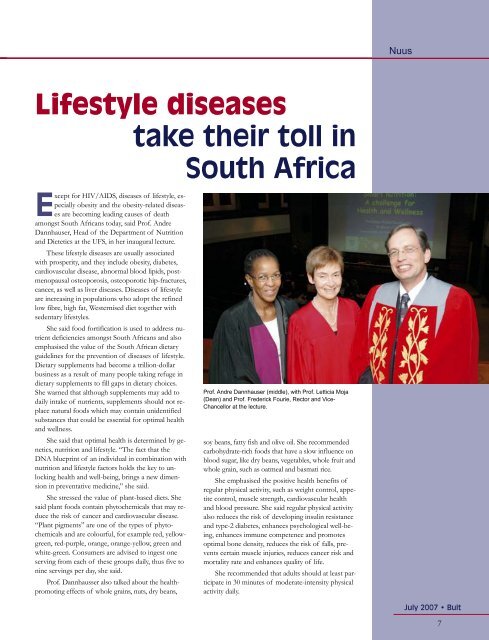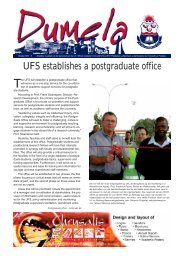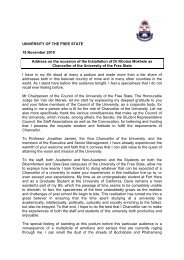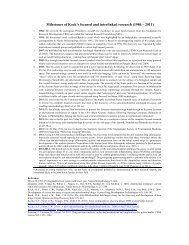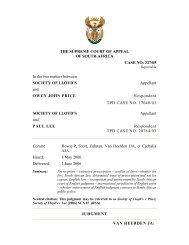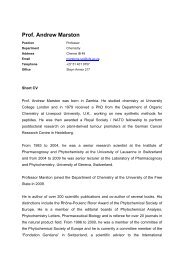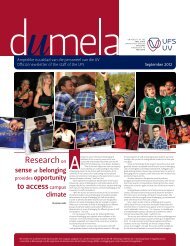Julie - University of the Free State
Julie - University of the Free State
Julie - University of the Free State
Create successful ePaper yourself
Turn your PDF publications into a flip-book with our unique Google optimized e-Paper software.
Lifestyle diseases<br />
take <strong>the</strong>ir toll in<br />
South Africa<br />
Except for HIV/AIDS, diseases <strong>of</strong> lifestyle, especially<br />
obesity and <strong>the</strong> obesity-related diseases<br />
are becoming leading causes <strong>of</strong> death<br />
amongst South Africans today, said Pr<strong>of</strong>. Andre<br />
Dannhauser, Head <strong>of</strong> <strong>the</strong> Department <strong>of</strong> Nutrition<br />
and Dietetics at <strong>the</strong> UFS, in her inaugural lecture.<br />
These lifestyle diseases are usually associated<br />
with prosperity, and <strong>the</strong>y include obesity, diabetes,<br />
cardiovascular disease, abnormal blood lipids, postmenopausal<br />
osteoporosis, osteoporotic hip-fractures,<br />
cancer, as well as liver diseases. Diseases <strong>of</strong> lifestyle<br />
are increasing in populations who adopt <strong>the</strong> refined<br />
low fibre, high fat, Westernised diet toge<strong>the</strong>r with<br />
sedentary lifestyles.<br />
She said food fortification is used to address nutrient<br />
deficiencies amongst South Africans and also<br />
emphasised <strong>the</strong> value <strong>of</strong> <strong>the</strong> South African dietary<br />
guidelines for <strong>the</strong> prevention <strong>of</strong> diseases <strong>of</strong> lifestyle.<br />
Dietary supplements had become a trillion-dollar<br />
business as a result <strong>of</strong> many people taking refuge in<br />
dietary supplements to fill gaps in dietary choices.<br />
She warned that although supplements may add to<br />
daily intake <strong>of</strong> nutrients, supplements should not replace<br />
natural foods which may contain unidentified<br />
substances that could be essential for optimal health<br />
and wellness.<br />
She said that optimal health is determined by genetics,<br />
nutrition and lifestyle. “The fact that <strong>the</strong><br />
DNA blueprint <strong>of</strong> an individual in combination with<br />
nutrition and lifestyle factors holds <strong>the</strong> key to unlocking<br />
health and well-being, brings a new dimension<br />
in preventative medicine,” she said.<br />
She stressed <strong>the</strong> value <strong>of</strong> plant-based diets. She<br />
said plant foods contain phytochemicals that may reduce<br />
<strong>the</strong> risk <strong>of</strong> cancer and cardiovascular disease.<br />
“Plant pigments” are one <strong>of</strong> <strong>the</strong> types <strong>of</strong> phytochemicals<br />
and are colourful, for example red, yellowgreen,<br />
red-purple, orange, orange-yellow, green and<br />
white-green. Consumers are advised to ingest one<br />
serving from each <strong>of</strong> <strong>the</strong>se groups daily, thus five to<br />
nine servings per day, she said.<br />
Pr<strong>of</strong>. Dannhausser also talked about <strong>the</strong> healthpromoting<br />
effects <strong>of</strong> whole grains, nuts, dry beans,<br />
Pr<strong>of</strong>. Andre Dannhauser (middle), with Pr<strong>of</strong>. Letticia Moja<br />
(Dean) and Pr<strong>of</strong>. Frederick Fourie, Rector and Vice-<br />
Chancellor at <strong>the</strong> lecture.<br />
soy beans, fatty fish and olive oil. She recommended<br />
carbohydrate-rich foods that have a slow influence on<br />
blood sugar, like dry beans, vegetables, whole fruit and<br />
whole grain, such as oatmeal and basmati rice.<br />
She emphasised <strong>the</strong> positive health benefits <strong>of</strong><br />
regular physical activity, such as weight control, appetite<br />
control, muscle strength, cardiovascular health<br />
and blood pressure. She said regular physical activity<br />
also reduces <strong>the</strong> risk <strong>of</strong> developing insulin resistance<br />
and type-2 diabetes, enhances psychological well-being,<br />
enhances immune competence and promotes<br />
optimal bone density, reduces <strong>the</strong> risk <strong>of</strong> falls, prevents<br />
certain muscle injuries, reduces cancer risk and<br />
mortality rate and enhances quality <strong>of</strong> life.<br />
She recommended that adults should at least participate<br />
in 30 minutes <strong>of</strong> moderate-intensity physical<br />
activity daily.<br />
Nuus<br />
July 2007 • Bult<br />
7


